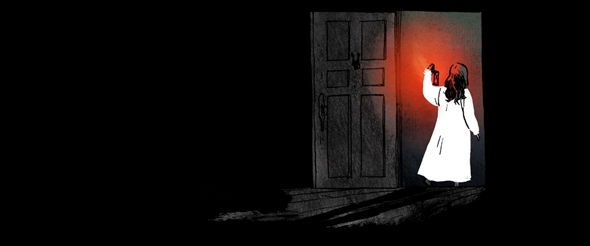To repeat myself: I’ve been developing my understanding of horror as a genre for a while now, and while I don’t feel like I’m much closer to unlocking the key to horror, I do have Thoughts. Thoughts about what breaks a horror story, and what strengthens it. Please, let’s talk about scary things!

Verisimilitude is scary. Straight reading of a story like an audiobook often fails for me, maybe because it’s too removed from the content. What has worked, however, is Limetown (which is set up like Serial/This American Life), Dionaea House (website/blog, capturing emails and texts, updated “as it happened” in 2004-2006), House of Leaves (scrapbooked and collected notes, except Johnny Truant. Go away, Johnny Truant.), The Innocence of a Place. There’s a reason so much horror has a framing device, or is as close to first person as a given medium can get. On some level, not being entirely sure it’s fiction is thrilling. Plus it tries to strip away a layer of narrative that separates the reader from the story. Distance throttles fear.
Gore is not scary. It’s gross and uncomfortable, which isn’t the same thing. Being incredibly grossed out by something happening to a character’s eye isn’t scary! But for another definition of horrific it can fit. Especially if it’s executed right — not just a slasher story. I’m thinking more of a particular Emily Carroll story, in which you see something disturbing to do with a characters face. (I don’t want to say more because the turn of it is so great.) But even in that story, there’s more going for it — suspense and not-knowing and an unnamed threat. Body horror is not the same as gore is what I’m winding toward, I think.
Innocuous turned sideways is scary. Small children! A dim hallway! A stranger’s smile! A man in a gray suit! The 66 bus! An itch under your skin! In the right hands all of these are terrifying. The familiar made unfamiliar. Your own reflection in the mirror, but something’s off.
Stupid characters are not scary. I can’t emphasize this enough. This goes for every genre. Don’t let your characters be stupid, writers. Please. You get like one colossally stupid decision for a character, and even then only if the character is established as having a weakness or habit that would lead them to that. You know what? Just to be safe? Don’t. Make your characters smart. It’s so much more terrifying if a smart character can’t avoid or defeat the terrible things.
So: Inevitability, but not predictability, is scary. If I’m rolling my eyes because that’s always the way this story goes, that’s not scary. But if I can’t blink because the characters have done everything right and the terrible thing is still coming? Ooh. Or they’ve done what seemed innocuous, but set them on a road with no exits that leads straight to Horrortown, which they oh-so-slowly realize? Nice.
Incomplete stories are not scary. There’s a difference between leaving things open or unsaid and not finishing the story. Explaining everything kills fear (see a later note) but there has to be some sense of completion. Finish a character arc, give an emotional resolution, do everything but. Everything but showing the monster, everything but naming the demon, everything but explaining the origin. The thing that is scary can be unfinished, inexplicable, unseen, but the story still needs an ending. Cutting off before the resolution is a way of preventing yourself from over-explaining the story, but it can ruin what you’re working toward. Like undercooking brownies.
No, scratch that. Undercooked brownies are delicious. Undercooked chicken. That’s what it’s like. Slightly undercooked, so it’ll be gross and make you ill if you eat it. Don’t undercook your stories.
Related: Lead-up and aftermath are scarier than the thing itself. I.e., shadows, not monsters; imagined threat, not reality. Be wary of showing me the guy in the monster suit. My imagination is more personal, and therefore more scary.
In the end, the biggest thing is that horror, like love, is personal. So no matter what anyone does, there may be some deep-seated part of my personality and my past that makes it fail for me, even as it works for a hundred others.